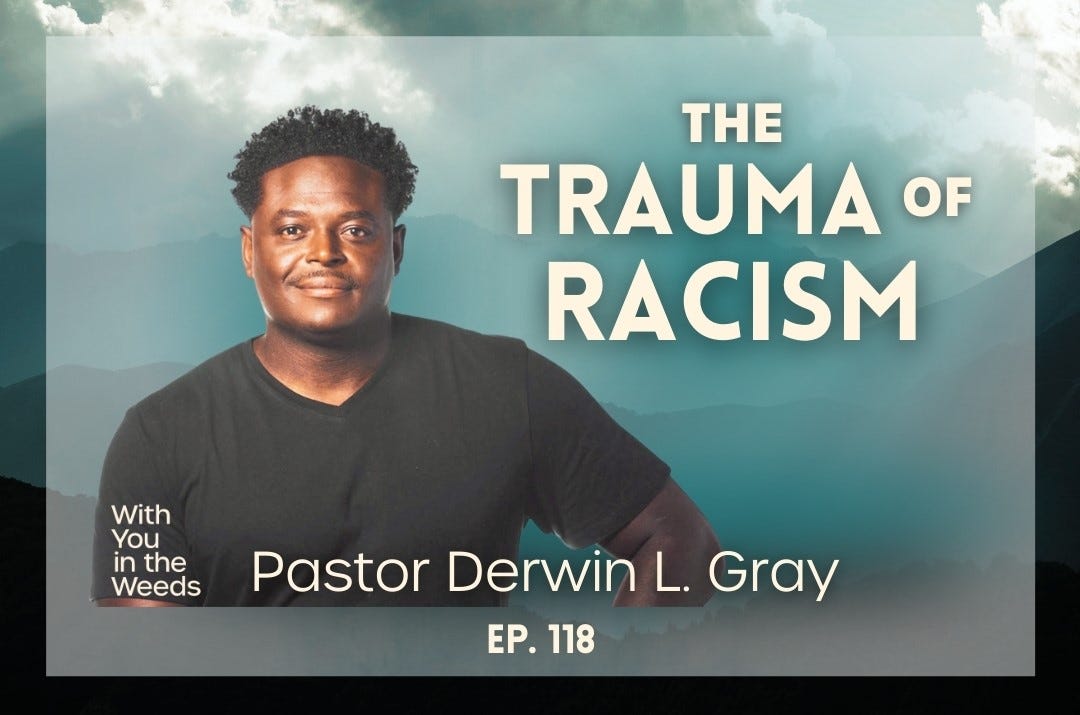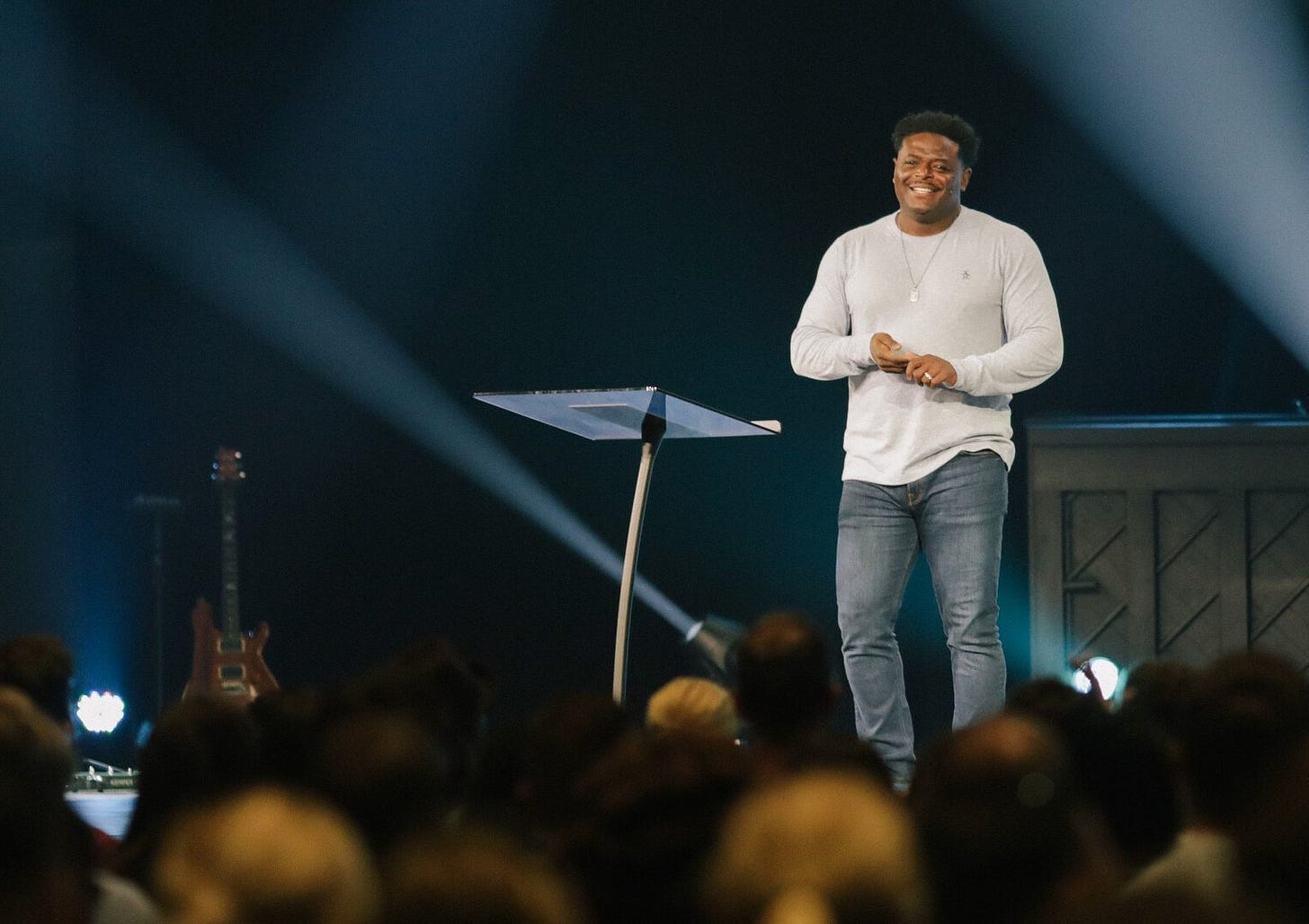The Trauma of Racism
Looking at race through God’s eyes
Though you may wonder if racial injustices, mistrust, and misunderstanding will always plague our society, it’s worth asking the question: Does the Bible have anything to say about healing racial divides?
Derwin L. Gray, former NFL player, pastor, author, and founder of Transformation Church in Charlotte, NC., says the answer to this question is unequivocally: YES.
In this special episode of our ongoing series, Surviving and Thriving After Trauma, Lynn and Shay talk with Derwin about the history of racism in America, its lasting impact, and the current need for ongoing reconciliation.
Derwin’s book, How to Heal Our Racial Divide: What the Bible Says, and the First Christians Knew, about Racial Reconciliation, proposes that racial reconciliation is God’s idea, and that the church should be a place that isn’t colorblind, but color-blessed.
This episode covers topics like:
The life and legacy of Dr. Martin Luther King, Jr.
The traumatic effects of racism
The challenge of overcoming indifference and opposition to reconciliation
Why the church should be at the forefront of racial reconciliation
Lynn & Shay Talk with Derwin
Shay: Derwin, welcome to With You in the Weeds! We’ve gotten feedback from people in our church that you have been one of their favorite guest speakers. So welcome, friend!
Derwin: Thank you and please give my regards to your wonderful congregation. One of the things that I look for when I am visiting another church is the hospitality of the people because hospitality reflects the love of Christ. I'm grateful for the work that you guys are doing – it is difficult to navigate our culture with grace and truth and you do it as well as anybody.
Lynn: Derwin, when you came in that weekend, I so enjoyed meeting with you and connecting with you. It’s amazing how you can instantly connect as brother and sister in Christ within just a few minutes.
Shay: When we approached the topic of racial trauma, I wanted to talk to someone who has been a healer in this area for many years. Derwin, you wrote an excellent book called How to Heal Our Racial Divide and we’re going to talk more about your vision for racial healing later on, but first, I want to ask you about Dr. King. We celebrated Martin Luther King Jr. Day a few days ago - tell me a little bit about what his life and legacy mean to you.
Derwin: Thank you for the kind words. When I think about Dr. King, the first thing that comes to mind is that he was 39 years old. I’m 53 and when I was 39, I barely felt like an adult, so I can’t imagine what it was like for this young man to have this incredible cause.
Every year on his birthday, I read Letter from Birmingham Jail. It's one of the greatest literary pieces of the 20th century. He’s a minister of the gospel of Jesus Christ and you see him bringing Aristotle and Socrates and the Apostle Paul together. It is just a magnum opus. He wasn’t a perfect man, but I respect that he gave his life to help this experiment called America to keep its promises true.
Before Dr. King had his dream, the Lord Jesus, the King of Kings, had a dream that he showed to the Apostle John. And in Jesus's dream, described in Revelation, people from every nation, tribe and language stood before the throne saying, “Worthy is the lamb that was slain”.
So racial reconciliation through the good news of the gospel is a Jesus idea. It's a God the Father idea. It's a Holy Spirit idea. At Transformation Church, we believe that racial justice is simply this: loving your neighbors as you love yourself. We believe that there's something beautiful and sacred about that.
America as a nation has come a long way. I was born in 1971; school integration was in 1970, so the civil rights movement has created laws that allow people to express their freedom. On the other hand, the history of slavery in America is as evil and ugly as it is anywhere.
As Dr. King said in the Letter from Birmingham Jail, there are segments of the church that are frankly indifferent or even opposing ethnic harmony and justice. I also see a lot of people giving lip service. They're tweeting a lot, but there's not a lot happening within their church. There's not a lot happening on the ground and there has to be more than just firing off angry tweets.
Shay: The sin of racism is common among all of us; every society wants to look down upon someone else to make themselves feel better and to have an identity. Can I ask, how have you personally experienced racism?
Derwin: Every square inch of this world has racism, and I believe it derives from the dark powers of evil. Satan wanted to look down on God, so part of the poison of sin in us is wanting to look down on someone else and oppress them.
The biggest part of racism isn’t being called racial slurs – although that has happened to me. Individual racism is easy to point out. What’s harder to see is racism that is systemic and generational.
For example, my mom was bussed to a predominantly white high school, and even though she played the violin, she was told in 10th grade, “People like you don’t play the violin, you’re more like maids”. Systemic racism includes things like not being able to vote and redlining laws for housing to keep minorities isolated.
My grandmother would tell me stories about lynchings in San Marcos, Texas. She would tell me stories about her dad being harassed by the police. I remember being a little boy going to a restaurant and a drunk white man saying, "Y'all shouldn't be in here."
One of the things that I teach our church is this: become so unoffendable in the gospel that a word used against you does not reflect who you are because you know you have the righteousness of Christ. I refuse to give any demon in hell the power over me by a word that does not reflect me.
Shay: That is so good. Thank you for that. I appreciate your words.
Lynn: When people experience racism at both the personal and institutional level, what kind of trauma does that cause?
Derwin: Older people have learned how to battle through that. Younger people, particularly millennials, carry a lot of offense. I see more of the trauma in them than people who are my age and older. One of the primary reasons it’s more traumatic now is because people in the past just put up with it. When young people today encounter racism, it's like this new experience for them.
So what can happen to them? I'll give you an example. I was speaking not too long ago. I told the congregation, “We don’t want to be colorblind; we want to be color-blessed. If you say you’re colorblind, you’re saying you don’t see the beautiful demonstration of God’s glory in different ethnicities.”
A young Korean girl came up to me with tears in her eyes and said, “Thank you for seeing me. Thank you for saying that in the resurrection, I'm going to be Korean, that God did not make a mistake.” It’s important that our white brothers and sisters understand that we are all made in the “Imago Dei”, the image of God.
If you withhold love from people of other ethnicities because you're afraid of getting hurt, it's only going to hurt your heart more. It's not true love unless you actually can be hurt. So how do we deal with the hurt? We have to deal with the hurt by understanding people are not Jesus. And we can refuse to allow what someone's done to us to keep us in a state of hurt.
Lynn: I follow you on social media, Derwin, and the other day when you said, "I try to read Letter from Birmingham Jail every year," I pulled that up and I read it and like you said, it has such passion, such clarity; Dr. King is weaving in Scripture, talking about what makes a just law and an unjust law.
But he does call out the church. He acknowledges that the church is the source of healing. But he's got to hold the church to the fire and say, “You're not doing your job.”
I have to sit with that and ponder it. Because on one hand, he’s saying that, as you said, racial unity is God’s idea, but the church is failing him, because he thought he would have all these white pastors come march alongside him. Instead he felt the pain of being alone and not having the support of his brothers and sisters in Christ.
Derwin: When you have a church where people believe in Jesus, but they don’t love people of other ethnicities, that’s not the whole gospel. Some churches have reduced the gospel to “Jesus died for my sins”. But the gospel is bigger than that. If God declares us righteous, how can we not see other Christians – from every nation, tribe, and tongue – as brothers and sisters? If we saw each other as the righteousness of Christ, racism would be rooted out.
If God declares us righteous, how can we not see other Christians – from every nation, tribe, and tongue – as brothers and sisters? If we saw each other as the righteousness of Christ, racism would be rooted out.
Lynn: I highlighted this quote from the end of MLK's Letter from Birmingham Jail, and I think it resonates with our conversation together:
"Let us all hope that the dark clouds of racial prejudice will soon pass away and the deep fog of misunderstanding will be lifted from our fear-drenched communities and in some not-too-distant tomorrow, the radiant stars of love and brotherhood will shine over our great nation with all of their scintillating beauty.”
I think the vision that he casts is so excellent, so biblical. I'm humbled to read this and get a glimpse of what that time was like but also to really try to get inside someone else's perspective and really try to understand.
We should never underestimate the power of giving the gift of empathy. You can never fully understand someone else’s trauma; you personally may have never lived it. But it doesn't cost us anything to try and understand what someone else has been through and attempt to put ourselves in someone else's shoes.
Everyone has been through something painful or hard, even though our experiences differ. So I encourage people to use the power of empathy. It’s a gift you can give freely. That’s where my heart is right now.
Shay: Derwin, there is a prayer in your book that I want to pray as we end our time here:
"Father, regardless of our ethnicity, class, or gender, we were dead, doomed, and separated from you and each other. But you overflow with mercy and love, and love us with an everlasting love that is life-giving and sin-forgiving. You sent Jesus as a gift of grace. King Jesus, your grace is more amazing than I realize. Your grace is bigger and better than I know.
Give me eyes to see your grace so I can experience what it did for me and how it included me in your Father's family. Holy Spirit, I, along with my multi-colored siblings, am the dwelling place of the Most High God. May we love each other as Jesus loved us. Sacrificially, we are the body of Jesus, a wondrous mosaic, a new race of grace. Amen.”
Thank you so much for being with us today.
Derwin: Thank you, my pleasure!
Listen to Lynn & Shay’s entire conversation with Derwin:
Recommended Resources:
How to Heal Our Racial Divide - Derwin L. Gray
Letter from Birmingham Jail - Dr. Martin Luther King, Jr.




